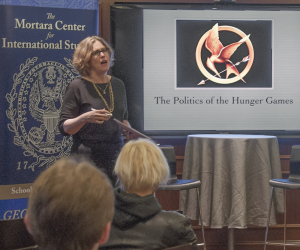
Professor Daniel Nexon related “The Hunger Games” to modern politics in his talk Wednesday afternoon.
Professor Daniel Nexon discussed the link between various forms of popular culture and politics in “The Hunger Games” trilogy Wednesday afternoon at the Mortara Center.
Nexon began his talk by examining the historical instances in which entertainment meshed with government. He said that popular films and books have shaped the political discussion for large audiences, and he gave examples such as the connection of “Star Trek” to NASA as well as the link between popular television show “24” and enhanced interrogation techniques used against suspected terrorists.
“There’s long been a general interest, I think, in the relationship between popular culture and politics,” Nexon said. “Exposure to certain ideas in popular culture might then condition our understanding and ethics about the way the world works.”
Nexon said that the most powerful genre for these sorts of connections is science fiction.
“In science fiction there is a tremendous emphasis on constructing worlds and giving them truthiness or verisimilitude,” he said.“They pretend to be real and therefore they have to work out their own rules, their own logic.”
Nexon then turned from the history of how popular culture influenced politics to what he said is a current example, “The Hunger Games” by Suzanne Collins. According to Nexon, because the influence of “The Hunger Games” has extended to real-world politics, it cannot be classified simply as an interesting story
“People are using the solidarity gesture [from]‘The Hunger Games’ as a way of expressing their political aspirations,” he said.“We see some really interesting examples of this in the Thai protest and Hong Kong protest.”
The politics of the tyrannical Panem, the fictional setting of “The Hunger Games,” have many parallels to the real world and follow similar patterns of current regimes that restrict free speech, according to Nexon. Specifically, Nexon likened Panem to the People’s Republic of China, a country infamous for violations of human rights.
“This is a very classic imperial strategy and it works in empires the same way that it works in Panem,” Nexon said. “When you keep [people] isolated, when you don’t give them very significant glimpses into one another’s lives and you don’t let them communicate with one another, it makes it very easy to contain unrest.”
“The Hunger Games” also provides a good representation of historical trauma and the difficulty it takes countries to move past it, according to Nexon. Prior to the timeline in the movies and books, Panem was torn apart during a period known as the Dark Days. They had a lasting effect that continued to dog society when “The Hunger Games” begins.
“Panem is trapped in re-inflicting the same trauma over and over and over again and picking at the wound,” Nexon said. “How does it do that? It does it through the Hunger Games.”
Nexon said he saw the theme of politics of trauma as being representative of the human condition in general. He examined a scene in “The Hunger Games”in which the protagonist is forced to explain to children that they are standing on the graves of other citizens from District 12. Nexon said he found this scene particularly moving.
“We all play and operate on the graveyards of the past and on the graveyards of past atrocities,” Nexon said.“Like Panem, we need to figure out for ourselves how we reconcile to that fact.”
Nexon also discussed the link between “The Hunger Games” and the popularity of reality television shows. He said that they are similar because in both, entertainment comes from laughing at or making fun of the suffering of others.
“The broader issue of course is one about voyeurism, particularly the voyeurism of pain and suffering,” Nexon said.“The way that a lot of reality television shows work [is] by essentially putting us in the position of voyeurs.”
Nexon was introduced by Director of the Mortara Center for International Studies Kathleen McNamara, who said that symbols can play an important part in political messages. She said that the use of symbolism from the “The Hunger Games” in real life political movements shows a connection between the book and current issues some countries face daily.
“The point is that the symbols are actually doing potentially a lot of work in rearranging political coalitions,” McNamara said. “[They’re] reshaping the way that people think about their preferences and the potential possibilities of politics.”
Zachary Burdette (SFS ’17), who attended the event, said he did not see the parallel between media and “The Hunger Games” as unique.
“I think in a sense that a lot of people get a masochistic voyeurism from a lot of different things in life,” he said.“Being aware that there are systems of oppression that you aren’t actively challenging has the same kind of effect.”
Jesse Reiff (SFS ’17) said he has renewed interest in the movie after hearing Nexon explain its relationship to politics.
“I want to rewatch ‘Hunger Games’ to reexamine the themes discussed,” Reiff said.














